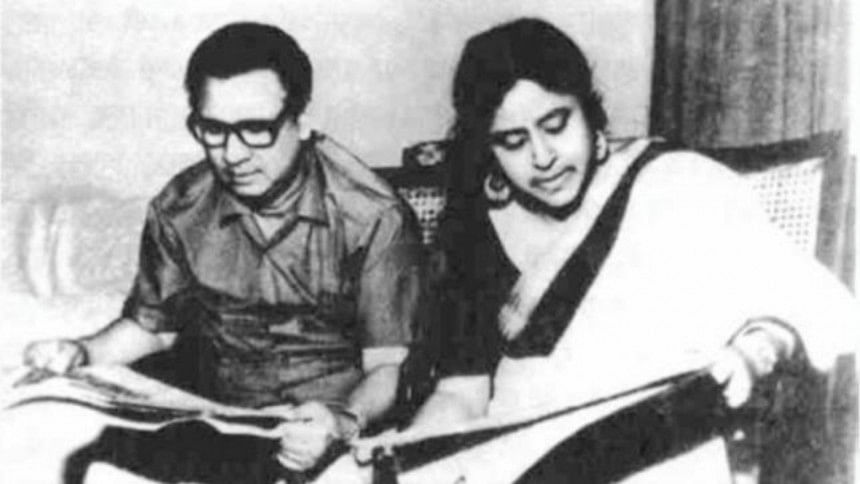Tajuddin Ahmad: A leader of incredible moral integrity and political acumen

Tajuddin Ahmad, our nation's first prime minister and founder of its government in exile, was mercilessly gunned down and bayoneted, in wrongful captivity, just after performing wudu, alongside his three Mujibnagar Government compatriots, Syed Nazrul Islam, Mansur Ali and AHM Qamruzzaman during the early hours of November 3, 1975. Upon hearing the news of her husband's death, my grandmother, Zohra Tajuddin Lily, shed her last tears as she realised that whatever the tragedy of her personal loss, losing Tajuddin was a far greater loss for the country.
In our own times where the ability to ruthlessly pursue, acquire, flaunt, and misuse wealth and power at others' expense is often regarded as a hallmark of greatness, Tajuddin stands apart in stark contrast. During our country's struggle for independence he told his fellow freedom fighters, "Let us work in such a way so that we cannot be found in the pages of history."
Who was the man behind this idealistic yet austere statement?
Tajuddin, born to a well-to-do landowning family in Kapasia need not have taken part in a struggle that saw him spend much of his adult life in jail as a political prisoner. Tajuddin memorised the Quran under the tutelage of his father Yasin Khan and was inspired to pursue higher studies by his mother Meherunnisa. Both parents cultivated his moral ethos. A voracious reader, his keen intellect was taken note of by four imprisoned revolutionaries and mentors who fought against British rule. Tajuddin was the only student to finish the large stack of books they had assigned. Recommendations from elders would see him through St Nicholas and St Gregory schools where he further broadened his horizons.
Long before acquiring a position of power, he was known as a peacemaker by his childhood friends. They recall that Tajuddin would never start conflicts but would rather find ways to resolve them. Hardly an adolescent, Tajuddin would enlist the support of his mother to cook for victims of cholera who were cast out to the riverside. No one else dared approach them. The young Tajuddin would tend to them and feed them. When his father passed away, Tajuddin as a young adult, voluntarily gave land away to those in need and in debt.
In 1959, when my nana Tajuddin chose my nanu Zohra Khatun Lily, his major requirement was that his spouse be someone who could endure struggle and hardship. The bride's wedding jewellery was made of beli phul (Jasmine), their symbolic rings were just strings. In many quarters of our society today, such a beautifully simplistic ceremony would be discarded for materialistic extravaganza. Nanu would tell me that nana was not only her husband, but her greatest mentor. If she had to live her life a hundred more times knowing of the tragic outcome she would, just to share more time with him. Their marriage was more than just a ceremony.
While he was forthright in dissent with those in power, he would speak softly with and care for those who worked for him. He was once found missing uncharacteristically from his Mujibnagar office only to be found with a wet towel in hand caring for his office staff who had come down with a fever. When he was the finance minister, an individual who had refused Tajuddin's fleeing wife shelter during the Pakistani military crackdown was a candidate for a particular posting. Tajuddin promoted the man based solely on his merit, putting his feelings aside.
The uncompromising moral integrity, astute mind, and wisdom beyond his years were tools Tajuddin honed in his private life and wielded in his public life with great success. Zulfikar Ali Bhutto, fearing Tajuddin's prowess, did not participate in a public debate with him over the Awami League's 6-points programme of 1966. Tajuddin was the key organiser of Awami League's civil disobedience campaigns and crafted the historic speeches we quote to this day. Tajuddin brought the various leaders on the run out of hiding to form our first government and established Mukti Bahini. He handpicked men of the highest calibre to help represent the fledgling nation; Barrister Amirul Islam whose statement projecting our resolve was conveyed by Senator Ted Kennedy to the American Public; Muyeedul Hasan who was part of the team to orchestrate the Soviet-Indian pact to keep other powers at bay; and advocate Nurul Qader who won over the support of the reluctant Muslim community who were integral to Indian Congress Party's electoral success. Professor Anisuzzaman, Rehman Sobhan, Dr Swadesh Bose and the likes were part of his planning cells and advisory committee.
While fighting the war, Tajuddin oversaw the sheltering and feeding of 10 million of our refugees who fled from genocide to India. He later stood up to and earned the respect of the World Bank president. After all was said and done, he quietly resigned from his cabinet position in disagreement over the direction in which the country was headed.
When on such historic dates we mourn our fallen heroes, let us reflect upon their lives in earnest and emulate their best qualities in our own. Tajuddin, an avid gardener, planted saplings of jaba phul (China rose) during his final period of captivity. The jaba phul continued to bloom long after he was gone. Let us then, as his fellow countrymen and as patriots, bloom together to give rise to the Shonar Bangla we fought for, lest we bury Tajuddin's ideals, too, alongside his body.
Taj Iman Ahmad Ibn Munir is the grandson of Tajuddin Ahmad and founder of Jaagoron: a transformative movement for peace and unity.

 For all latest news, follow The Daily Star's Google News channel.
For all latest news, follow The Daily Star's Google News channel. 



Comments